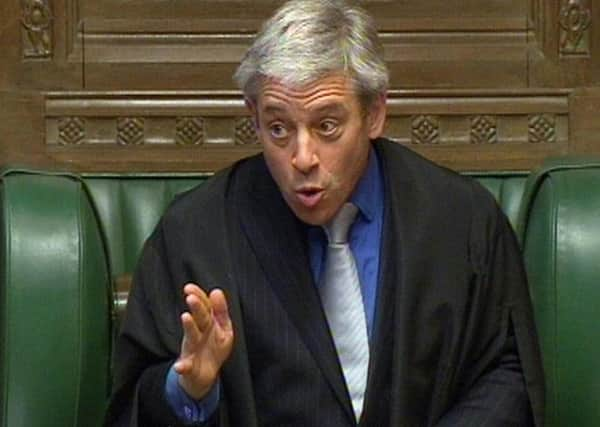Bring down the curtain on pantomime in the Commons


THE pantomime season usually starts in the run up to Christmas, but there are some people who say it’s happening all year round – during Prime Minister’s Questions.
In the past it was often compared to a gladiatorial contest, an erudite battle of words between political sparring partners. But increasingly for those living outside the Westminster bubble, House of Commons debates are seen as little more than a Punch and Judy show.
Advertisement
Hide AdAdvertisement
Hide AdAnyone tuning in to PMQs for the first time will find precious little oratory, instead they’ll get to witness a barrage of heckling and barracking that would test even the most hardened stand-up comics.
For some, this is part of the cut and thrust and theatre of politics in this country, while for others it’s just a wall of meaningless noise – a bit like the “wah wah woh wah” sound made by adults in the Peanuts cartoons.
But it’s not just ordinary folk who are growing tired of these playground antics, Commons Speaker John Bercow has appealed to party leaders to find ways to curb the “yobbery and public school twittishness” of their MPs at Prime Minister’s Questions and has written to David Cameron, Ed Miliband and Nick Clegg seeking their responses to evidence that the tone and content is putting voters off politics.
It’s not the first time Mr Bercow has voiced concerns.
Last year he criticised the noise, particularly at PMQs, claiming “the decibel level exceeds anything that Deep Purple – the loudest band of the 1970s – would have dreamed of in their heyday.”
Advertisement
Hide AdAdvertisement
Hide AdHis concerns are backed up by research from the Hansard Society which found the most common descriptions of the weekly 30-minute Commons session were “noisy”, “childish”, “over the top” and pointless.
The Speaker has long called for reform of the set-piece session for the sake of improving parliament’s public image and has been strident in chastising offending MPs.
Focus groups were asked about PMQs as part of the Hansard Society’s annual examination of public engagement and more than two-thirds said there was “too much party political point-scoring instead of answering the question”.
Almost half said it was “too noisy and aggressive” with a similar number disagreeing that MPs behaved professionally, while only 12 per cent said it made them “proud of our Parliament.”
Advertisement
Hide AdAdvertisement
Hide AdSpeaking to the Independent, Mr Bercow said: “There are people who think culturally the atmosphere is very male, very testosterone-fuelled and, in the worst cases, of yobbery and public school twittishness.
“I don’t think we should be prissy about this, but I am not sure we’re setting a good example to the next generation of voters,” he said, adding that he wanted to hear the views of party leaders before considering a Speaker’s Commission.
Dr Ruth Fox, director and head of research at the Hansard Society, believes attitudes need to change. “The public think the conduct of MPs is childish and wouldn’t be tolerated in other work places.
“They think politicians are simply not taking the issues that affect their lives seriously enough,” she says.
Advertisement
Hide AdAdvertisement
Hide Ad“Reform is overdue if PMQs is to move from being an inward-looking and self-referential event towards its proper role of scrutiny and accountability.”
Martin Smith, professor of politics at York University, says the whole process of PMQs has become formulaic. “What was once used to hold the Prime Minister to account has become all about trying to grab the headlines.
“It’s always been raucous, it’s part of the tradition, but other than the participants and journalists it doesn’t really mean anything to ordinary people, it just confirms the perception that many people have that politicians aren’t like the rest of us.”
The fact these debates are televised only exacerbates the situation.
Advertisement
Hide AdAdvertisement
Hide Ad“It’s about the leaders trying to catch each other out and trying to come up with a soundbite that makes it on to the ten o’clock news,” says Prof Smith.
“It’s wrapped up in the idea of being a political arena, but in reality politics is done a long way from Parliament in Downing Street and Cabinet, so there’s a bit of pretence about it all. The serious accountability takes place in the select committees, not half an hour once a week at lunchtime.”